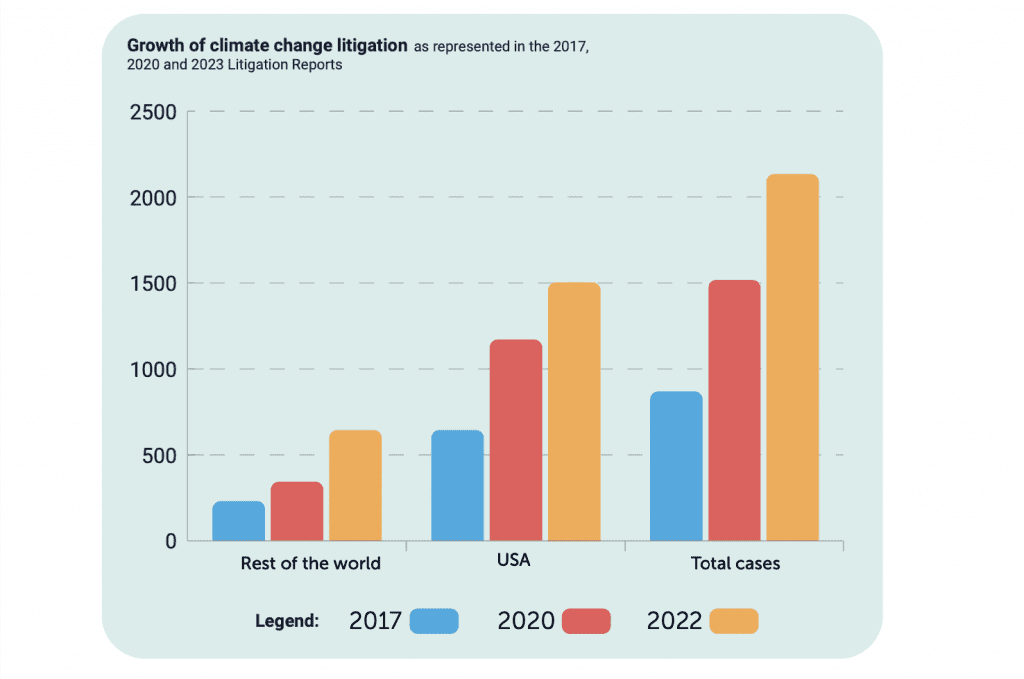Climate change-related lawsuits are on the rise. The total number of lawsuits that center on climate change has more than doubled since 2017 and the number of newly-initiated cases is growing on a global scale, according to a recent report from the United Nations. Based on a review of cases focused on climate change law, policy, or science collected up until December 31, 2022, the UN Environment Program (“UNEP”) and the Sabin Center for Climate Change Law at Columbia University report that 2,180 climate cases was initiated in 2022, up from 884 in 2017. In their joint “Global Climate Litigation Report: 2023 Status Review,” UNEP and the Sabin Center stated that such rising figures demonstrate that climate litigation is becoming “an integral part of securing climate action and justice.”
Delving into the climate cases, UNEP and the Sabin Center stated that they have been waged in “international, regional, and national courts, tribunals, quasi-judicial bodies, and other adjudicatory bodies, including special procedures of the UN and arbitration tribunals.” As of December 31, 2022, 1,522 of the cases have been initiated in the U.S.,127 cases have been filed Australia; 79 in Great Britain; 62 in the European Union; 38 in Germany; 34 in Canada; 30 in Brazil; 26 in New Zealand; and 22 in France.
While roughly 70 percent of the cases were filed in the U.S., the UN and the Sabin Center state that climate litigation is “taking root all over the world,” with about 17 percent of cases now being reported in developing countries, including Small Island Developing States.

In terms of the substantive nature of the cases, the report states that most ongoing climate litigation falls into one – or more – of the following six categories: (1) cases relying on human rights enshrined in international law and national constitutions; (2) challenges to domestic non-enforcement of climate-related laws and policies; (3) litigants seeking to keep fossil fuels in the ground; (4) advocates for greater climate disclosures and an end to greenwashing; (5) claims addressing corporate liability and responsibility for climate harms; and (6) claims addressing failures to adapt to the impacts of climate change.
While no shortage of the cases center on governments’ alleged failures to comply with legal duties under existing climate regulations or to abide by international human rights law in connection with their climate policies and/or inactivity, “increased public awareness and understanding of climate change have spurred actions against corporations” over their climate change statements.
On this front, the UNEP and the Sabin Center report highlights a Dutch court’s order that oil and gas giant Shell comply with the Paris Agreement and reduce its carbon dioxide emissions by 45 percent from 2019 levels by 2030. “That was the first time that a court found a private company has a duty under the Paris Agreement,” according to UNEP and the Sabin Center. More broadly, UNEP and the Sabin Center point to cases waged against companies that center on: (1) the protection of investors when it comes to companies’ climate disclosures; (2) the protection of consumers from companies’ alleged greenwashing activities; and (3) the protection of consumers from companies’ misrepresentations about their products.
Climate disclosures: These cases involve plaintiffs bringing suits against companies claiming that they relied on their statements to make financial decisions, as well as cases brought by governments enforcing securities disclosures and consumer protection laws, and NGOs challenging alleged greenwashing or climate-washing campaigns. “Investors continue to file suits alleging that public disclosures relating to climate risk were misleading or fraudulent, both in relation to the risk that a transition away from fossil fuels poses to their business or investment assets and the risk of physical impacts to infrastructure, operations and supply chains associated with climate change.” In short, these cases are usually grounded in national consumer protection or corporate laws.
The regulatory context for climate disclosures is in flux, according to the report, which cites the approval of non-binding guidelines on reporting climate-related information by the European Commission in 2019. In 2021, the Commission adopted the Corporate Sustainability Reporting Directive, a legislative proposal to strengthen the nature and extent of sustainability or ESG reporting in the EU Union, which would constitute substantial regulatory reform in the ESG reporting space. And a new rule aimed at enhancing publicly traded companies’ disclosure of climate-related risks has been proposed by the U.S. States Securities and Exchange Commission. “These regulations could lead to litigation on multiple fronts.”
Greenwashing complaints: Greenwashing complaints allege that corporate advertising contains false or misleading information about climate change impacts contrary to responsible advertising or fair competition legislation or standards. Greenwashing claims have also relied on marketing campaigns that are incompatible with a company’s investments. For example, a complaint was filed at Ad Standards Australia against HSBC bank for continued fossil fuels investments despite a marketing campaign to support the protection of the Great Barrier Reef (Complaint to Ad Standards on HSBC’s Great Barrier Reef Ad 2021).
As for net-zero claims …

Product misrepresentations: In the U.S. cases have been filed by cities and states against fossil
fuel companies questioning their role in climate disinformation and misrepresentation of products. In Connecticut v. Exxon Mobil Corp. (2022), for instance, the state of Connecticut sued ExxonMobil to hold the company accountable for violating the Connecticut Unfair Trade Practices Act in connection with alleged deceptive acts to create uncertainty about climate science.
Meanwhile, in City of New York v. Exxon Mobil Corp. (2021), New York City sued several oil companies under the city’s consumer protection laws arguing that the companies engaged in deceptive trade practices by misrepresenting their fossil fuel products to consumers, misleading consumers about the impact of fossil fuels. And still yet, in Vermont v. Exxon Mobil Corp. (2022), the state of Vermont brought a protection lawsuit against fossil fuel companies alleging deceptive and unfair business practices in connection with the companies’ sale of their products.
Looking forward, UNEP and the Sabin Center predict a rise in the number of cases dealing with climate migration (i.e., human movement driven by environmental factors); cases brought by Indigenous peoples, local communities and other groups disproportionately affected by climate change; and cases addressing liability following extreme weather events. The report also anticipates challenges in applying the science of climate attribution, as well as a rise in “backlash” cases against litigants that aim to dismantle regulations that promote climate action.
THE BOTTOM LINE: Climate change litigation is increasing and broadening in geographical reach, while the range of legal theories is expanding.











